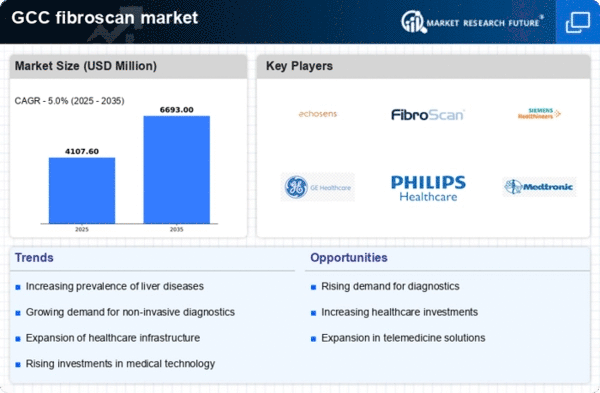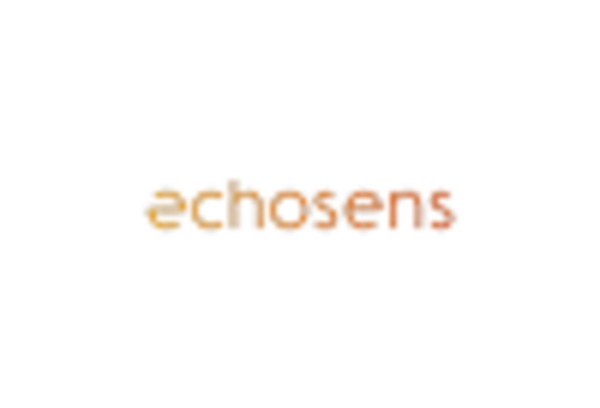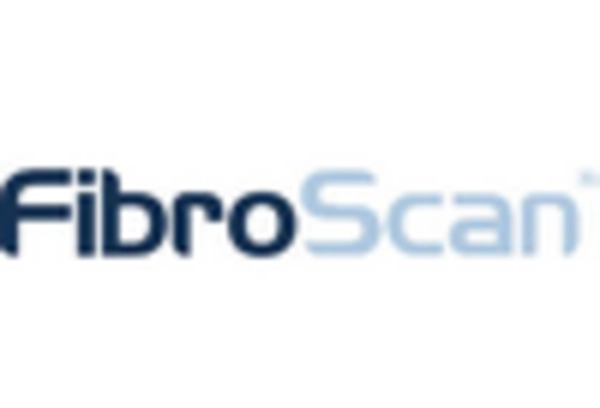Growing Awareness of Liver Health
There is a notable increase in public awareness regarding liver health in the GCC, which is positively influencing the fibroscan market. Educational campaigns and health initiatives aimed at promoting liver health are encouraging individuals to seek early diagnosis and treatment. This heightened awareness is leading to a greater acceptance of non-invasive diagnostic methods, such as fibroscan, among both healthcare professionals and patients. As a result, the market is expected to expand as more individuals opt for regular screenings, potentially increasing the market size by 20% over the next few years.
Expansion of Healthcare Infrastructure
The ongoing expansion of healthcare infrastructure in the GCC is a crucial factor driving the fibroscan market. Governments in the region are investing heavily in healthcare facilities, aiming to enhance the quality of care and accessibility for patients. This investment includes the procurement of advanced diagnostic equipment, such as fibroscan devices, to improve liver disease management. As new hospitals and clinics are established, the demand for effective diagnostic tools is likely to rise, contributing to a projected market growth of 10% annually. This trend indicates a robust future for the fibroscan market in the region.
Increasing Prevalence of Liver Diseases
The rising incidence of liver diseases, particularly non-alcoholic fatty liver disease (NAFLD) and hepatitis, is a significant driver for the fibroscan market. In the GCC region, lifestyle changes and dietary habits have contributed to a higher prevalence of these conditions. According to health statistics, liver disease cases have increased by nearly 15% in the last decade. This alarming trend has prompted healthcare providers to seek effective diagnostic tools, thereby boosting the demand for fibroscan technology. The ability of fibroscan devices to provide quick and accurate assessments of liver stiffness is becoming increasingly vital in managing these diseases.
Technological Advancements in Fibroscan Devices
The fibroscan market is experiencing a surge due to rapid technological advancements in diagnostic devices. Innovations such as improved elastography techniques and enhanced imaging capabilities are making fibroscan devices more efficient and user-friendly. These advancements are likely to increase the accuracy of liver disease diagnosis, which is crucial in the GCC region where liver-related health issues are prevalent. The introduction of portable and compact fibroscan devices is also expanding their accessibility in outpatient settings. As a result, the market is projected to grow at a CAGR of approximately 8% over the next five years, driven by these technological improvements.
Regulatory Support for Non-Invasive Technologies
Regulatory bodies in the GCC are increasingly supporting the adoption of non-invasive diagnostic technologies, which is beneficial for the fibroscan market. Policies aimed at promoting innovative healthcare solutions are facilitating the entry of advanced fibroscan devices into the market. This regulatory support is crucial as it not only ensures the safety and efficacy of these devices but also encourages manufacturers to invest in research and development. As a result, the market is likely to see a rise in new product launches and innovations, potentially increasing market share by 15% in the coming years.
















